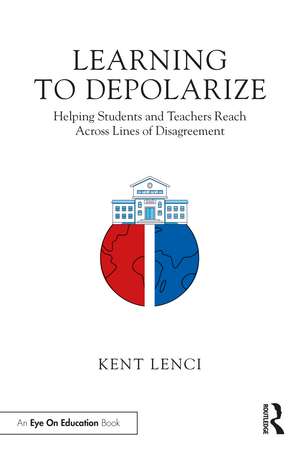Learning to Depolarize: Helping Students and Teachers Reach Across Lines of Disagreement
Autor Kent Lencien Limba Engleză Paperback – 25 oct 2022
Topics covered include the causes and consequences of political polarization in our society, why schools must address the challenge head-on, bridge-building in the classroom, media literacy and social emotional learning as tools for depolarization, and partnering with parents across the divide.
Each chapter offers current research as well as practical strategies and classroom anecdotes. Appropriate for teachers of all grade levels and subject areas, the book will help you reconsider your classroom and school’s role in forging a more depolarized future.
| Toate formatele și edițiile | Preț | Express |
|---|---|---|
| Paperback (1) | 211.59 lei 6-8 săpt. | |
| Taylor & Francis – 25 oct 2022 | 211.59 lei 6-8 săpt. | |
| Hardback (1) | 888.20 lei 6-8 săpt. | |
| Taylor & Francis – 25 oct 2022 | 888.20 lei 6-8 săpt. |
Preț: 211.59 lei
Nou
Puncte Express: 317
Preț estimativ în valută:
40.49€ • 44.12$ • 34.12£
40.49€ • 44.12$ • 34.12£
Carte tipărită la comandă
Livrare economică 23 aprilie-07 mai
Preluare comenzi: 021 569.72.76
Specificații
ISBN-13: 9781032246604
ISBN-10: 103224660X
Pagini: 162
Ilustrații: 2 Line drawings, black and white; 2 Illustrations, black and white
Dimensiuni: 152 x 229 x 9 mm
Greutate: 0.3 kg
Ediția:1
Editura: Taylor & Francis
Colecția Routledge
Locul publicării:Oxford, United Kingdom
ISBN-10: 103224660X
Pagini: 162
Ilustrații: 2 Line drawings, black and white; 2 Illustrations, black and white
Dimensiuni: 152 x 229 x 9 mm
Greutate: 0.3 kg
Ediția:1
Editura: Taylor & Francis
Colecția Routledge
Locul publicării:Oxford, United Kingdom
Public țintă
Professional Practice & DevelopmentCuprins
1. Introduction: We Have Always Been Those Students 2. Polarization Awaits Our Children 3. Depolarization Is a Job for Schools 4. Cross-Cutting Dialogue Through Cross-Country Connections 5. Teaching Students to Build Bridges Within the Classroom 6. Depolarization Requires Managing Media and Emotions 7. Positioning Faculty to Encourage Depolarization 8. Partnering with Parents Across the Political Divide 9. Conclusion: Finding the Courage to Depolarize 10. Appendix: Consolidated List of Resources
Notă biografică
Kent Lenci has been an educator for more than 20 years, as a teacher, coach, and school leader at the middle school level. He is the recipient of the Margot Stern Strom Teaching Award from Facing History and Ourselves and the Teacher of the Future designation from the National Association of Independent Schools. Kent founded Middle Ground School Solutions, which is dedicated to helping schools honor political and ideological differences. He can be reached through his website: www.middlegroundschools.com.
Recenzii
"Learning to Depolarize is thoughtful, constructive, and beautifully written—a terrific book. It makes a strong case for taking up these difficult issues in schools, and it will be very helpful to lots of folks."
—Dr. Richard Weissbourd, Senior Lecturer at the Harvard Graduate School of Education and Kennedy School of Government
"In Learning to Depolarize, Lenci offers all of us—educators and parents/guardians—a research-based approach to engaging the "other," those whose beliefs differ from our own. The education landscape has become the epicenter for the polarizing culture wars, and Lenci offers practical suggestions that stem from his own experiences in the classroom. This book is insightful, well-researched, straightforward, courageous, and inspirational. In short, this book is a must read!"
—Bonnie J. Ricci, Executive Director, International Council Advancing Independent School Accreditation (ICAISA)
—Dr. Richard Weissbourd, Senior Lecturer at the Harvard Graduate School of Education and Kennedy School of Government
"In Learning to Depolarize, Lenci offers all of us—educators and parents/guardians—a research-based approach to engaging the "other," those whose beliefs differ from our own. The education landscape has become the epicenter for the polarizing culture wars, and Lenci offers practical suggestions that stem from his own experiences in the classroom. This book is insightful, well-researched, straightforward, courageous, and inspirational. In short, this book is a must read!"
—Bonnie J. Ricci, Executive Director, International Council Advancing Independent School Accreditation (ICAISA)
Descriere
In this provocative new book, Kent Lenci describes how educators can tackle the challenge of preparing students to communicate and collaborate across lines of deep disagreement—to face the political and ideological "other"—despite the conventional wisdom that schools should be apolitical.
